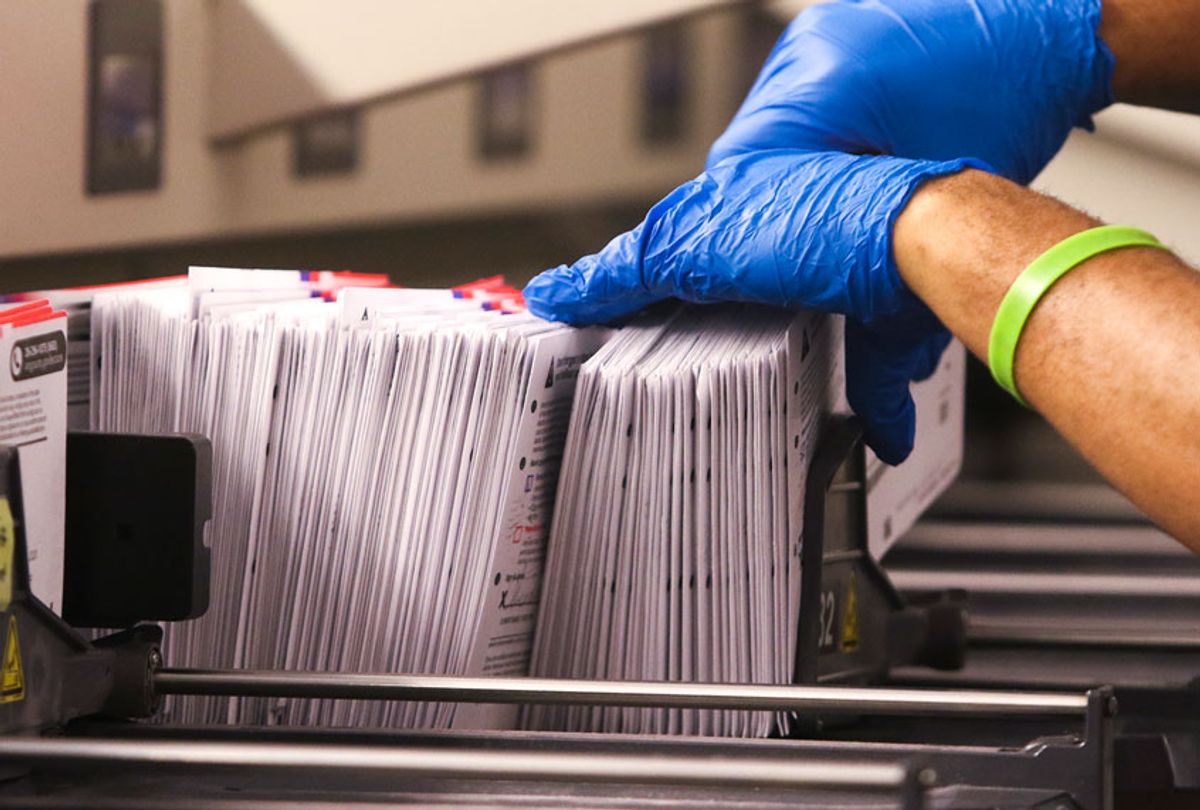A federal judge ruled on Tuesday that all Texas voters can apply to vote by mail during the coronavirus pandemic, days after the state Supreme Court had blocked an expansion of the state's absentee voting system.
The Texas Democratic Party filed a lawsuit last month arguing that the state's existing rules, which limit absentee ballots to voters over 65, the disabled, people who are in jail but have not been convicted and people with firm travel plans, would impose unconstitutional burdens on in-person voters by forcing them to risk infection. A recent study linked in-person voting in April's Wisconsin election to a rise in coronavirus cases in subsequent weeks.
U.S. District Judge Fred Biery agreed with the Democrats on Tuesday and ordered that all voters under 65 "who seek to vote by mail to avoid transmission of the virus" can do so. He also argued that the party was likely to succeed in proving that the existing rules violate the 26th Amendment's protections against voting discrimination based on age.
Texas Attorney General Ken Paxton, a Republican who vehemently opposes the expansion and threatened criminal charges against voting rights groups that promote mail voting to those not currently eligible, vowed to appeal the ruling.
"The district court's opinion ignores the evidence and disregards well-established law," Paxton said, according to the Texas Tribune.
Biery said in his ruling that the Democratic Party was also likely to succeed in proving that Paxton's threats amounted to voter intimidation.
"Paxton's statements operate to discourage voters from seeking mail-in ballots because of their fear of criminal sanction or victimization by fraud," he wrote, "and have the intention and the effect of depriving legally eligible voters' access to the franchise."
Biery wrote in a lengthy and colorful order that opened by quoting the preamble to the Declaration of Independence that the right to vote "should not be elusively based on the whims of nature."
"Two hundred forty-years on, Americans now seek Life without fear of pandemic, Liberty to choose their leaders in an environment free of disease and the pursuit of Happiness without undue restrictions," he wrote. "There are some among us who would, if they could, nullify those aspirational ideas to return to the not so halcyon and not so thrilling days of yesteryear of the Divine Right of Kings, trading our birthright as a sovereign people for a modern mess of governing pottage in the hands of a few and forfeiting the vision of America as a shining city upon a hill."
Paxton argued that Biery should wait until the entirety of the case plays out in state court. Democrats also filed a similar state lawsuit last month. A state district court and an appeals court similarly ruled that voters who fear infection should be able to vote by mail, but the state Supreme Court put a hold on the ruling while it reviews the case.
Paxton has also echoed President Trump's debunked conspiracy theories that mail voting was linked to voter fraud.
Biery in his ruling said the state showed "little or no evidence" of widespread fraud where mail voting is already widely used.
"The Court finds the Grim Reaper's scepter of pandemic disease and death is far more serious than an unsupported fear of voter fraud in this sui generis experience," he said. "Indeed, if vote by mail fraud is real, logic dictates that all voting should be in person."
But Rick Hasen, a law professor at the University of California, Irvine, predicted that "there are good reasons to believe [the ruling] will soon be reversed by the 5th Circuit."
Citing the ongoing state lawsuit, Hasen said that federal courts typically wait until such litigation is complete, suggesting that this was a case of a "federal court jumping the gun."
He also predicted that the appeals court would reject the argument that current rules violate the 26th Amendment's age protections.
"It is quite novel to apply the 26th amendment in this context … I suspect the much more conservative 5th Circuit is going to be much more skeptical of these arguments than this district court is," he wrote. "Indeed, when one reads from the opening of the opinion, it is clear where the judge's sympathy lies. … There's a VERY STRONG case to be made under both statutory interpretation and constitutional law principles to get there, but this is not the kind of careful, cautious opinion that could potentially survive 5th Circuit review."



Shares